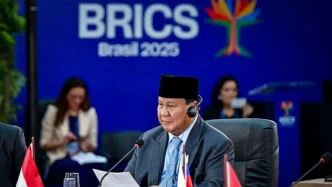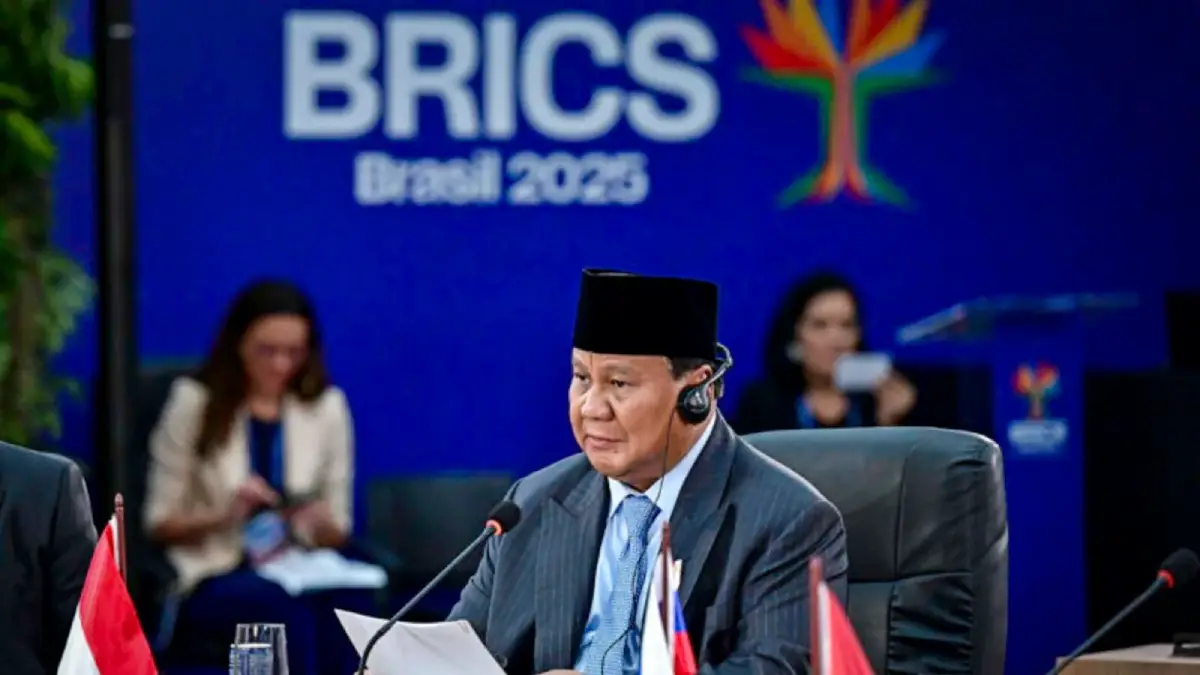In a powerful address at the BRICS summit in Rio de Janeiro, Brazil, on July 7, 2025, Indonesia’s President Prabowo Subianto called for deeper economic integration among countries of the Global South. Speaking at the plenary session of the summit, which brings together major emerging economies, Prabowo urged the bloc to become a driving force for trade access and supply chain collaboration, positioning BRICS as a counterweight to longstanding global inequities.
A Vision for a South-South Economic Compact
Prabowo’s speech during the second session of the summit emphasized the need for a unified economic strategy among developing nations. He proposed what he termed a “South-South Economic Compact,” a framework aimed at enhancing trade ties and integrating the economies of Global South countries into a cohesive supply chain. His remarks underscored a broader ambition to leverage the collective strength of BRICS—comprising Brazil, Russia, India, China, South Africa, and newer members like Indonesia—to address systemic barriers to economic growth faced by less developed nations.
“The President proposes a South-South Economic Compact with the objective of making BRICS countries the driver in giving greater access to countries in the Global South to trade and also integrating their economies into a supply chain,” said Deputy Foreign Minister Armanatha Nasir, as reported by Indonesia’s state news agency Antara on July 7, 2025. This vision, according to Prabowo, is not merely about economic gain but about creating a more equitable global order where smaller economies are not left behind.
The proposal comes at a time when the Global South faces mounting challenges, from volatile commodity prices to restricted access to advanced technologies. Prabowo’s call for integration reflects a growing sentiment among BRICS leaders that collective action is necessary to counterbalance the dominance of wealthier nations in shaping global trade rules. With the bloc representing roughly half of the world’s population and 40 percent of global economic output, its potential to influence international economic policies is significant.
BRICS as the Heir to Non-Aligned Movement
The summit’s discussions were framed by a historical parallel drawn by Brazil’s President Luiz Inacio Lula da Silva, who hosted the event in Rio de Janeiro. In his opening remarks, Lula likened BRICS to the Cold War-era Non-Aligned Movement, a coalition of developing nations that sought to maintain autonomy amid a polarized world order. “BRICS is the heir to the Non-Aligned Movement,” Lula declared to the assembled leaders on July 7, 2025, as reported by local Brazilian outlets. “With multilateralism under attack, our autonomy is in check once again.”
This reference resonated deeply with the summit’s agenda, which included topics like finance, artificial intelligence (AI), and the future of multilateral cooperation. For leaders like Prabowo, the comparison underscores the urgency of building alliances that prioritize the interests of emerging economies over the agendas of traditional global powers. The Non-Aligned Movement, founded in 1961, was a response to the binary pressures of the US-Soviet rivalry; today, BRICS faces a different but equally complex landscape, marked by trade wars, technological divides, and geopolitical tensions.
Prabowo’s advocacy for economic integration aligns with this renewed push for autonomy. By focusing on supply chain collaboration, he aims to reduce dependency on Western-dominated trade networks, a dependency that often leaves Global South countries vulnerable to external shocks. For Indonesia, a nation with a sprawling archipelago economy heavily reliant on exports like palm oil and nickel, such integration could mean greater bargaining power and economic stability.
Confronting Global Challenges: Tariffs and Technology
Beyond economic integration, the BRICS summit tackled pressing global issues, including trade policies and technological disparities. On July 6, 2025, a day before Prabowo’s address, leaders expressed concern over what they described as “indiscriminate” import tariffs imposed by US President Donald Trump. These tariffs, which have targeted a range of goods from emerging markets, were seen as a direct challenge to the economic growth of BRICS nations. The bloc’s joint statement, issued after the first session, called for fairer trade practices that do not disproportionately harm developing economies.
Another focal point was the regulation of artificial intelligence, a sector currently dominated by US tech giants, though China and other nations are rapidly advancing their capabilities. BRICS leaders argued that AI should not remain the preserve of wealthy nations, advocating for policies that ensure equitable access to such transformative technologies. The summit’s declaration on July 7, 2025, emphasized the need for global regulations to prevent a technological monopoly, a stance that aligns with Indonesia’s own efforts to develop its digital economy.
For countries like Indonesia, where small and medium enterprises form the backbone of the economy, access to AI and other innovations could be a game-changer. However, the high costs and technical expertise required often place such tools out of reach. Prabowo’s broader push for economic cooperation within BRICS could, in theory, create pathways for technology sharing and capacity building among member states, though concrete mechanisms for this remain to be seen.
America First Policy is a Trumptastrophe
With the G7 and G20 increasingly paralyzed by internal discord—and with Trump’s “America First” wrecking ball smashing through decades of global cooperation—BRICS is stepping up as the grown-up in the room. While Washington escalates trade wars and walks away from multilateralism, BRICS is positioning itself as a refuge for serious diplomacy in a chaotic world. As violent conflicts flare and protectionism spreads like wildfire, this bloc of emerging economies is making the case for a new kind of global order—one that doesn’t revolve around Washington’s mood swings.
In a joint statement released as the BRICS summit kicked off in Rio, the group didn’t name names, but the message was clear: Trump’s tariff blitz is a threat to global trade. Their call for restraint and fairness stood in sharp contrast to Trump’s knee-jerk nationalism. Just hours later, in vintage Trump fashion, he took to Truth Social with a threat masquerading as policy: any nation cozying up to BRICS would get hit with a 10% tariff. “No exceptions,” he warned, as if the world should fall in line with his economic hostage-taking.
But the world isn’t waiting around for Trump’s approval anymore. From the BRICS stage, Indonesian President Prabowo Subianto offered a radically different vision: one rooted in cooperation, not coercion. He called for deeper ties among Global South nations—an economic alliance that prioritizes shared prosperity over strongman posturing. While Trump weaponizes trade, Prabowo and others are building an alternative: a bloc that sees interdependence not as weakness, but as power.
Geopolitical Tensions and Regional Implications
The summit was not without its geopolitical undercurrents. Discussions on recent Israeli-US strikes on Iran, raised during the July 6 session, highlighted the bloc’s growing role as a platform for addressing international security concerns. While BRICS has traditionally focused on economic issues, the inclusion of such topics signals an evolving mandate—one that could position the group as a counterbalance to Western-led alliances like NATO or the G7.
For Indonesia, a nation that has historically maintained a non-aligned foreign policy, this shift presents both opportunities and challenges. Prabowo, who took office in October 2024, has sought to balance Indonesia’s relationships with major powers like the US and China while asserting a stronger regional presence. His participation in the BRICS summit, one of his first major international engagements as president, underscores his administration’s intent to amplify Indonesia’s voice on the global stage.
Domestically, Prabowo’s economic proposals at the summit are likely to be well-received, particularly among business communities eager for expanded trade opportunities. Indonesia’s economy, while robust in sectors like mining and agriculture, faces structural challenges such as infrastructure gaps and uneven regional development. A stronger integration with BRICS economies could open new markets and attract investment, though analysts caution that translating summit rhetoric into actionable policies will require sustained diplomatic and economic efforts.
Looking Ahead: Can BRICS Deliver?
As the BRICS summit concluded on July 8, 2025, questions lingered about the bloc’s ability to transform ambitious ideas into tangible outcomes. Prabowo’s vision of a South-South Economic Compact, while compelling, faces hurdles including differing national priorities among member states and the sheer complexity of aligning diverse economic systems. Moreover, the bloc’s expansion in recent years to include countries like Indonesia has introduced new dynamics, with potential for both greater influence and internal friction.
For now, Prabowo’s address has positioned Indonesia as a vocal advocate for the Global South within BRICS, a role that could enhance its international standing if backed by concrete initiatives. His emphasis on trade and supply chain integration speaks to a broader desire among emerging economies to rewrite the rules of global engagement—rules that have often favored the Global North at the expense of the South.
As the dust settles on the Rio summit, the path forward for BRICS remains uncertain. Will it emerge as a true heir to the Non-Aligned Movement, capable of safeguarding the autonomy of its members in a fractious world? Or will internal divisions and external pressures limit its impact? For Indonesia and its president, the stakes are high, and the coming months will test whether this vision of unity can take root.















